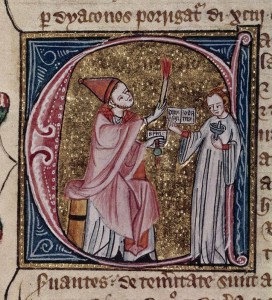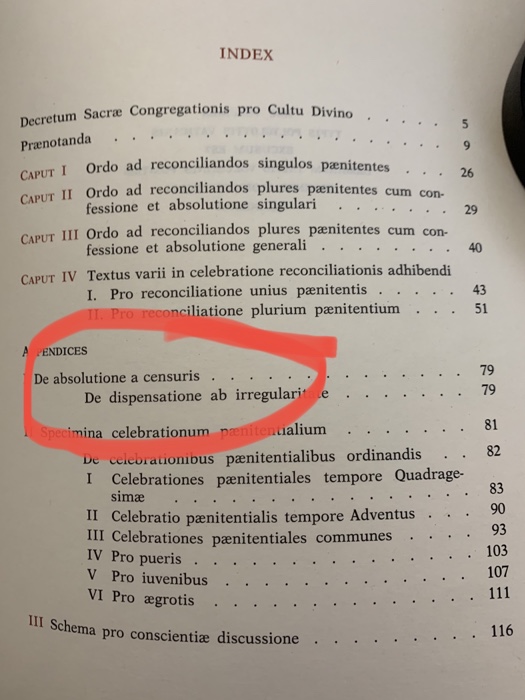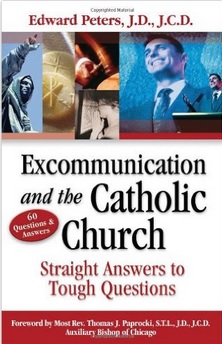
Excommunication ceremony (British Library Royal, 6 E VI f216v)
From a reader…
QUAERITUR:
Like Marines, I’ve heard that once you’re baptized a Catholic, you’re always a Catholic, no matter if you fall away from the faith, or don’t even practice Catholicism.
It is something that once given, cannot be taken away. Is that correct?
Are you still considered Catholic if you get excommunicated?
If you get excommunicated, do you just need to repent of your sins through Confession, or does one need to get re-baptized?
Firstly, you know from the Creed that there is ONE baptism for the forgiveness of sins. A person can never be re-baptized. The sacrament, once given, imparts an ontological character to the soul that never goes away. Once baptized, you are baptized for eternity, no matter where you wind up.
You can never be a non-Catholic after you are baptized or received into the Catholic Church. Once you enter into formal membership, that’s it. You can attempt to make formal separations from the Church. You can behave as if you were never Catholic. But if something comes up that requires interaction with the institution of the Catholic Church for some reason, you will be treated as a Catholic, not as a non-Catholic. The Church still considers you bound by her laws no matter what.
Most of the time, when we sin we don’t incur a censure that would prohibit us from receiving the sacraments or, in the case of clerics, an office. Most of the time, we can just go to confession and that’s that.
Some sins incur censures. They are dealt with by getting the censure absolved AND the sin absolved.
A first principle to keep in mind is that an excommunication can only be incurred if the person commits a mortal sin. That means that all the conditions for a mortal sin must apply. It must be grave matter, known to be wrong, and willed anyway when performed. If a person truely doesn’t know any better, or is under duress or is otherwise in his or her will not giving consent to sin, then the person is not guilty of comitting a mortal sin, even though objectively he did something gravely wrong.
Examples, a woman is threatened with harm unless she has an abortion, a man is drunk when he steals a Host, a bishop is absolutely convinced in true sincerity that he must consecrate bishops for the good of the Church even if he has been begged by the Pope not to do so.
There are different ways to incur excommunication, a censure which means that you cannot receive the sacraments, even in most cases receive absolution! The censure has to be lifted first.
There are excommunications that are incurred automatically and those that are declared or imposed. The automatic ones (latae sententiae), if the sin/crime that incurred them is public, manifest, are usually then confirmed by competent authority with a declared censure (ferendae sententiae).
Most censures can be lifted by either a priest with the faculty to do so (most confessors) and diocesan bishops. Some censures, having to do with very serious sins, are reserved to the Holy See for their lifting or absolution. These very serious reserved censures have to do with violations of things that are close to the core of the life of the Church, like abuse of the Eucharist, breaking the Seal of confession, etc.
In most cases, however, if a person is aware of incurring an excommunication in a hidden, non-public way, she can usually go to a local priest who is a confessor and have the censure lifted in the context of sacramental confession. The censure is lifted and then the person can be absolved.
However, if the sin incurred an excommunication that is hidden and reserved to the Holy See, the confessor cannot lift the censure. In this case – if he knows what to do and seminaries generally don’t teach what I am about to write – he can absolve the sin, but must exhort the person to make an appointment to return after a period of a some days, perhaps ten days. In the meantime, that priest must communicate the situation to the Apostolic Penitentiary (AP) in Rome, which handles censures in the interal forum (confession). He gives the AP a generic, anonymized description of the person, circumstances, and sin and asks a judgement, the faculty to lift it if deemed opportune, and a penance. This can be sent by priest to the AP by fax. The AP always answers within 24 hours. The priest confessor would receive an envelope from the AP through the papal nuncius office and post, containing another envelope with the comments and faculty from the AP. The next time that penitent came, at the appointed day and time, the priest could then communicate the advice of the AP, the penance, and then lift the censure. At that point the penitent could freely make use of the sacraments again.
If the excommunication is a public matter, the Holy See (or bishop who imposed it) would also have to make public statements that the imposed censure was lifted.
Keep in mind that, now, there are no more reserved SINS. There are reserved CENSURES. Sins and censures are absolved separately. Think in terms of a gravely evil act being a grave sin AND a grave crime. Two steps are needed, one for the sin and another for the crime. So, while it is possible to absolve a sin in case of necessity or undue burden to the person who otherwise might have to wait, the censure can only be absolved by a priest with the faculty to do so.
NB: Virtually all priests now have the faculty to absolve the sin of abortion and the censure it incurs.
The older, traditional rite of penance, with its form for absolution was far more pastoral and merciful than the post-Conciliar modern form, because it spells out the issue of absolution of censures before the absolution of sins. Here is the older, traditional form (always in Latin but here in translation):
May our Lord Jesus Christ absolve you; and I, by His authority, absolve you from every bond of excommunication (suspension [for clerics only]) and interdict, in as much as I am able and you require. + Thereupon, I absolve you from your sins in the name of the Father, and of the Son, + and of the Holy Spirit. Amen.
Notice the two steps: censures, if any and according to the priest’s faculties, and then sins.
In the older form of absolution you know what is going on and, it being in Latin, you never have to doubt its validity.
The modern, new-fangled, post-Conciliar Ordo Paenitentiae has a form for absolution of censures, but I’ll wager that 99/100 priests who say only the Novus Ordo don’t know anything about it or have every used it, even when they should.

This is important stuff, obviously.
Holy Church is beautifully merciful in making sure that people in these delicate situations don’t have to wonder if they are absolved of sins or reconciled with the Church. The Church’s law is dripping with mercy so that people can be at ease. That is why priests need to know this stuff and also apply it in preaching and the confessional.
For further clarity, folks should have recourse to Dr. Ed Peters’ book, Excommunication and the Catholic Church.
Remember, there is no sin that we little mortals can commit that is so bad that God will not forgive,provided we confess our sins and ask for forgiveness. God’s mercy is magnificent and it is ours for the asking.
GO TO CONFESSION!
Join Our Telegram Group : Salvation & Prosperity










![Papal Power and the Obedience of the Faithful [Must Read]…](https://salvationprosperity.net/wp-content/uploads/2023/12/papal-power-and-the-obedience-of-the-faithful-must-read-327x219.jpg)